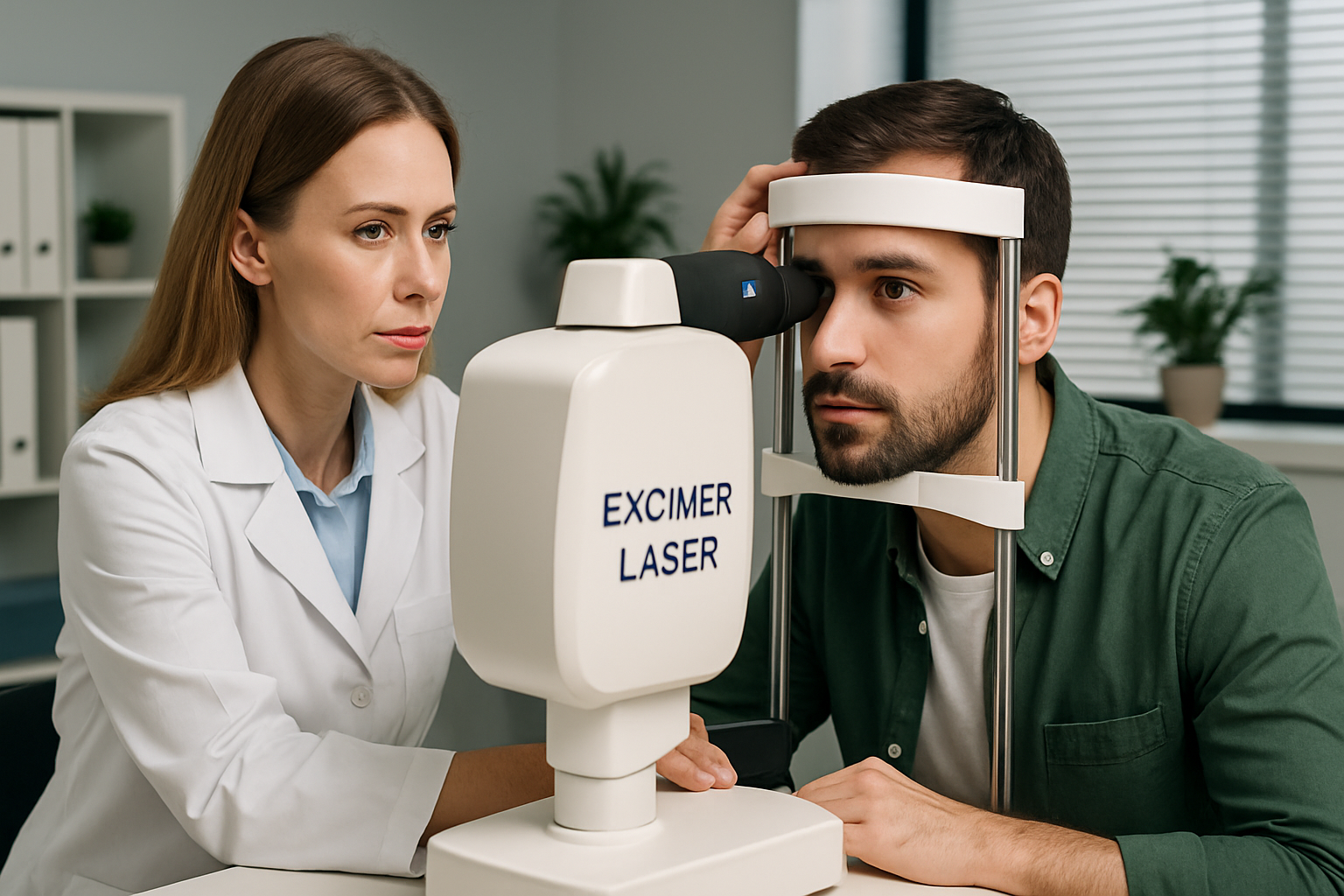Laser eye surgery, once a futuristic concept, has now become a mainstream procedure for those looking to correct vision problems. Whether you’re nearsighted (myopia), farsighted (hyperopia), or have astigmatism, laser surgery offers a long-term solution to ditch glasses and contact lenses. But is it the right choice for you? In this guide, we explore everything you need to know in 2025 about laser eye surgery—from how it works to recovery tips, costs, technological advancements, patient reviews, and expert insights.
What Is Laser Eye Surgery?
Laser eye surgery refers to a group of procedures designed to reshape the cornea using laser technology, thereby improving vision. The most common types are:
- LASIK (Laser-Assisted In Situ Keratomileusis)
- PRK (Photorefractive Keratectomy)
- SMILE (Small Incision Lenticule Extraction)
These procedures are considered elective, meaning they are typically not covered by insurance unless medically necessary. Despite being optional, they have transformed the lives of millions.
How Does Laser Eye Surgery Work?
The procedure uses an excimer laser or femtosecond laser to carefully remove corneal tissue. This reshaping allows light entering the eye to be properly focused onto the retina, providing clearer vision. Each procedure varies in how this reshaping is performed and how invasive the process is.
Types of Laser Eye Surgery and How They Differ
LASIK
- Most popular and widely performed
- Creates a corneal flap with a femtosecond laser
- Quick recovery—most patients return to normal activities within 24 hours
- Best for those with mild to moderate vision issues
PRK
- Surface ablation procedure (no flap created)
- Preferred for patients with thinner corneas or dry eyes
- Longer healing period (up to a week)
- Higher discomfort in early recovery
SMILE
- Minimally invasive with a small incision
- No flap, reducing risk of flap-related complications
- Effective for moderate to high myopia
- Lower incidence of dry eyes
Advanced Alternatives (2025)
- Contoura Vision: A topography-guided LASIK that personalizes treatment
- ReLEx: An evolution of SMILE offering even quicker recovery
Who Is a Good Candidate for Laser Eye Surgery?
You might be a good candidate if:
- You’re over 18 years old (ideally 21+)
- Your vision prescription hasn’t changed in the past 12 months
- Your eyes are generally healthy
- You understand the risks and benefits
Not recommended for:
- Pregnant or nursing women
- Individuals with uncontrolled diabetes or autoimmune diseases
- Those with very thin or irregular corneas
- People who engage in high-impact sports with risk of eye trauma
Risks and Potential Side Effects
Laser eye surgery has a high success rate, but it’s important to be informed:
Short-term Risks:
- Dry eyes
- Glare, halos, or starbursts at night
- Light sensitivity
- Mild discomfort during the first 24–48 hours
Long-term Risks:
- Under/overcorrection
- Regression of vision
- Rare complications like corneal ectasia
- Infections (very rare, especially with proper post-op care)
What to Expect During and After the Procedure
Before Surgery
- Comprehensive eye exam and corneal mapping
- Discussion of your medical history and lifestyle
- Eye drop regimen starts a few days before the procedure
During the Procedure
- Lasts about 15 minutes per eye
- Laser reshapes cornea precisely
- Surgeon uses computer-controlled tools
- Minimal discomfort with numbing eye drops
After the Procedure
- Blurred vision initially
- Burning or itching sensation for a few hours
- Most resume daily activities the next day (for LASIK)
- PRK patients may need 5–7 days before returning to work
How Much Does Laser Eye Surgery Cost in 2025?
In 2025, the average cost ranges:
- LASIK: $2,000–$3,500 per eye
- PRK: $1,800–$2,800 per eye
- SMILE: $2,500–$4,000 per eye
- Custom treatments (Contoura, ReLEx): $3,500–$5,000 per eye
Prices vary based on:
- Surgeon expertise
- Location
- Technology used
- Pre/post-op care packages included
Advantages of Laser Eye Surgery
- Freedom from glasses or contact lenses
- Enhanced night vision in most cases
- Immediate results (within 24–48 hours)
- Boost in confidence and convenience
- Proven long-term outcomes with minimal risk
Disadvantages and Limitations
- Cost may be prohibitive for some
- Some patients still need reading glasses after 40s
- Minor side effects like dry eyes may persist
- Not a cure for age-related vision decline (presbyopia)
Is Laser Eye Surgery Worth It?
Is laser eye surgery worth it? Yes, for many people, it is a life-changing procedure offering long-term freedom from glasses and contacts. However, the decision should be made after a thorough evaluation with a qualified eye surgeon. You should also consider your lifestyle, expectations, and any health conditions before proceeding.
Pro Tips from Eye Surgery Experts (2025)
- Schedule a thorough eye exam before deciding on surgery.
- Choose an experienced surgeon with at least 1,000+ procedures performed.
- Avoid screens for 24–48 hours post-op to speed up recovery.
- Use preservative-free eye drops regularly after the procedure.
- Don’t skip follow-up appointments—they are crucial.
- Be honest about your expectations to avoid disappointment.
- Avoid makeup and lotions around eyes for at least 1 week.
- Wear UV-protective sunglasses post-op to prevent damage.
- Stay hydrated to promote tear production and healing.
- Avoid swimming for 2–4 weeks depending on your doctor’s advice.
Frequently Asked Questions (FAQ)
What is the success rate of laser eye surgery?
Most laser eye surgeries have a success rate of over 95%, especially for LASIK. Patients often achieve 20/20 vision or better, with a high satisfaction rate.
Can I get laser eye surgery if I have astigmatism?
Yes, modern techniques like LASIK, SMILE, and Contoura Vision are effective for treating mild to moderate astigmatism.
How long does the result last?
For most people, the effects are permanent, although natural aging may cause vision changes. Enhancements can be done if needed after 10–15 years.
Is laser eye surgery painful?
No, the procedure itself is painless due to numbing eye drops. Some discomfort may occur during recovery, especially with PRK.
Can I wear makeup after the surgery?
It’s recommended to avoid eye makeup for at least a week post-procedure to prevent infections and complications.
Will I still need reading glasses?
Possibly. Laser surgery doesn’t prevent age-related presbyopia. Many patients over 45 may need reading glasses eventually.
Conclusion
Laser eye surgery in 2025 is safer, faster, and more customizable than ever before. While it’s not for everyone, the overwhelming majority of patients report high satisfaction and life-changing benefits. The key lies in selecting the right type of procedure and working with an experienced eye care provider.
Have you undergone laser eye surgery or are considering it? Share your experience or questions below—we’d love to hear from you!



